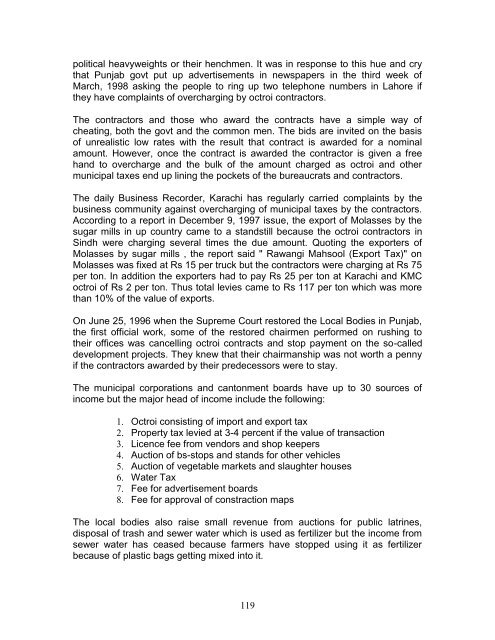Who Owns Pakistan - Yimg
Who Owns Pakistan - Yimg
Who Owns Pakistan - Yimg
Create successful ePaper yourself
Turn your PDF publications into a flip-book with our unique Google optimized e-Paper software.
political heavyweights or their henchmen. It was in response to this hue and cry<br />
that Punjab govt put up advertisements in newspapers in the third week of<br />
March, 1998 asking the people to ring up two telephone numbers in Lahore if<br />
they have complaints of overcharging by octroi contractors.<br />
The contractors and those who award the contracts have a simple way of<br />
cheating, both the govt and the common men. The bids are invited on the basis<br />
of unrealistic low rates with the result that contract is awarded for a nominal<br />
amount. However, once the contract is awarded the contractor is given a free<br />
hand to overcharge and the bulk of the amount charged as octroi and other<br />
municipal taxes end up lining the pockets of the bureaucrats and contractors.<br />
The daily Business Recorder, Karachi has regularly carried complaints by the<br />
business community against overcharging of municipal taxes by the contractors.<br />
According to a report in December 9, 1997 issue, the export of Molasses by the<br />
sugar mills in up country came to a standstill because the octroi contractors in<br />
Sindh were charging several times the due amount. Quoting the exporters of<br />
Molasses by sugar mills , the report said " Rawangi Mahsool (Export Tax)" on<br />
Molasses was fixed at Rs 15 per truck but the contractors were charging at Rs 75<br />
per ton. In addition the exporters had to pay Rs 25 per ton at Karachi and KMC<br />
octroi of Rs 2 per ton. Thus total levies came to Rs 117 per ton which was more<br />
than 10% of the value of exports.<br />
On June 25, 1996 when the Supreme Court restored the Local Bodies in Punjab,<br />
the first official work, some of the restored chairmen performed on rushing to<br />
their offices was cancelling octroi contracts and stop payment on the so-called<br />
development projects. They knew that their chairmanship was not worth a penny<br />
if the contractors awarded by their predecessors were to stay.<br />
The municipal corporations and cantonment boards have up to 30 sources of<br />
income but the major head of income include the following:<br />
1. Octroi consisting of import and export tax<br />
2. Property tax levied at 3-4 percent if the value of transaction<br />
3. Licence fee from vendors and shop keepers<br />
4. Auction of bs-stops and stands for other vehicles<br />
5. Auction of vegetable markets and slaughter houses<br />
6. Water Tax<br />
7. Fee for advertisement boards<br />
8. Fee for approval of constraction maps<br />
The local bodies also raise small revenue from auctions for public latrines,<br />
disposal of trash and sewer water which is used as fertilizer but the income from<br />
sewer water has ceased because farmers have stopped using it as fertilizer<br />
because of plastic bags getting mixed into it.<br />
119













